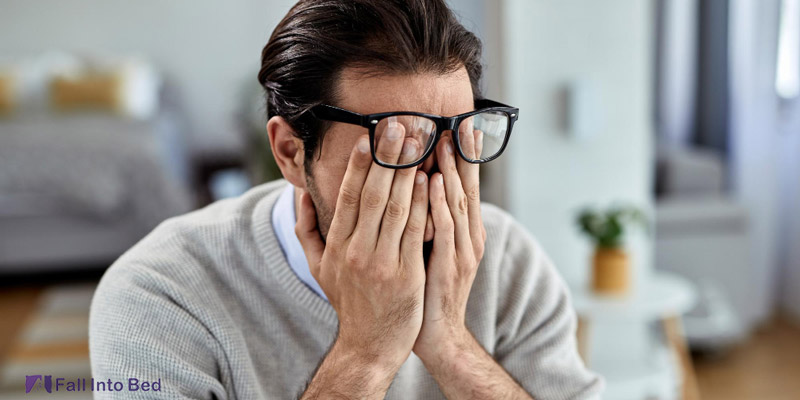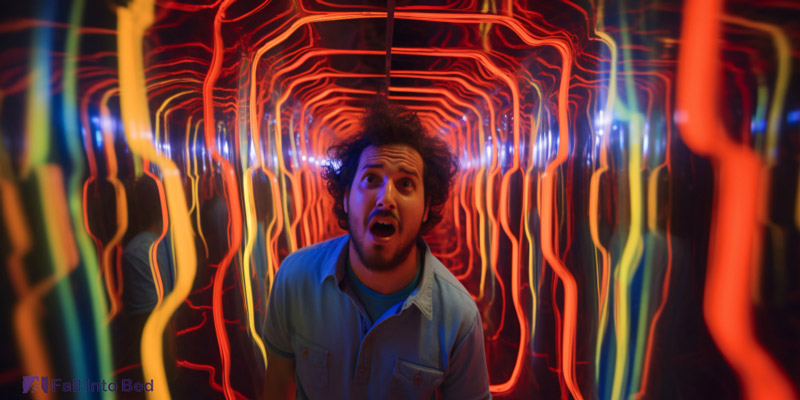Have you ever wondered what happens if we don’t sleep for 7 days or more? Now, you might think “nothing more than exhaustion and headache”. But you’d be amazed of what lack of sleep can do to our body. Afterall, our bodies are wired to sleep.
So this article is one of those “don’t try at home” ones! But it’s good to know the effects of prolonged sleep deprivation, so that you can avoid it! So stay tuned and awake, while we dive into a sleepless article.
The importance of sleep on your physical and mental health
Sleep is super important for our physical health. It helps our bodies repair tissues, build muscles, and strengthen our immune system. Getting enough sleep also plays a big role in managing hunger, which can help keep our weight in check. Plus, it supports heart health by lowering blood pressure. Simply put, a good night’s sleep recharges our energy and boosts our physical performance.
When it comes to our mental health, sleep is a game-changer. It’s essential for how we think and feel. Sleep helps us remember things better and make good decisions while keeping anxiety and depression at bay. A well-rested mind is also more creative and better at handling stress, making everyday challenges feel a bit easier.
In a nutshell, sleep is crucial for keeping both our bodies and minds in tip-top shape, helping us live healthier and happier lives.

What is sleep deprivation?
In simple terms, sleep deprivation refers to the condition of not getting enough sleep. It can either be due to medical issues like insomnia, or work conditions like night shifts. Stress and anxiety can also lead to sleep deprivation.
Chronic sleep deprivation can have severe impacts on our health. It can lead to serious health issues, including obesity, diabetes, cardiovascular diseases, and decreased life expectancy. It also negatively impacts mental health and can contribute to conditions like anxiety and depression.
To combat sleep deprivation, it’s important to establish a regular sleep schedule, create a comfortable sleep environment, manage stress and practice good sleep hygiene, such as reducing screen time before sleep and putting electronic devices far from the bed. If sleep deprivation persists, consulting a healthcare professional is essential for identifying underlying issues and finding effective solutions.
What happens if you don’t sleep for 7 days?
After 24 hours
For the first 24 hours, you may not feel as tired you think. You might feel a bit of fatigue and have slower reaction time.
Though you might think skipping sleep for 1 day doesn’t have a huge effect on your body, Studies show that staying awake for 24 hours is equivalent to having a blood alcohol concentration (BAC) of 0.1%, making you as impaired as if you were drunk!
So it’s not a good idea to pull all-nighters that often.
Mental effects of not sleeping for one day are difficulty concentrating, mild mood swings and irritability. If you fond yourself in a situation where you don’t have enough time to sleep, resting for 1 or 2 hours is better than skipping sleep altogether.

After 2 days
Staying awake for 2 days or 48 hour can have serious effects on your body, especially your immune system. In day2, you start to have memory issues like forgetting things or having trouble recalling recent events. You can’t think clearly and you feel heavy or sluggish. There are also symptoms like headache or droopy eyes.
If you’re really not able to sleep for this period of time, make sure you don’t consume caffeine and stay hydrated.
After 3 days
After 72 hours of staying awake, your immune system weakens even more, as a result of cortisol release in your blood. Also, you experience extreme exhaustion.
As for mental effects, around day 3 and 4 you might start having visual and auditory hallucinations. Your cognitive impairment becomes even more noticeable like poor problem-solving skills and judgement.
At around day 3, you start experiencing something called “microsleep”. This happens when the brain forces brief, uncontrollable bursts of sleep that last only a few seconds, even if you’re trying to stay awake.
These microsleeps can happen while doing routine tasks, like typing or walking, and you’re usually unaware until you “wake up” after a few seconds of zoning out. Microsleep can be dangerous since you might fall asleep during important tasks like driving or handling machinery.
At this point, your sleep cycle becomes severely disrupted. Even if you try to sleep, your brain may struggle to transition through the normal stages of sleep.

After 4 days
On day 4 of this dangerous journey, things get even worse for you. You start getting muscle pain and tremors and your blood pressure and heartrate gets fluctuated. Microsleep becomes more frequent and harder to resist.
If you try to sleep at this point, your body may not follow the usual sleep cycle at all. You’ll likely experience REM rebound, where the brain tries to quickly recover lost REM sleep by skipping other stages. This can result in vivid dreams or nightmares, leaving you feeling less rested even after sleeping for a long time.
After 4 days of staying awake, the hallucinations become even more intense and you develop strong paranoia and irrational thoughts. You also experience severe confusion and disorientation.
After 5 days
There is no need to day that you’re extremely fatigued and exhausted by now! After 5 days without rest, you have difficulty with coordination and fine motor tasks, like writing and typing. The chances of accidents are high due to slowed reflexes and difficulty concentrating.
Your blood pressure increases dramatically and you develop a higher risk of heart attack. You can also experience vision problems, like blurry vision. You also experience nausea due to lack of sleep.
As far as mental effects go, you experience dilutions and become severely disconnected with reality. Memory issues worsen to the point where you might have difficulty remembering the entire events of the day.

After 6 days
By this point, you experience sever cognitive decline, such as difficulty speaking or firming sentences and the risk of long-term damage to the brain increases. Prolonged sleep deprivation can lead to the death of brain cells due to stress and neuroinflammation.
The risk of falling asleep uncontrollably (microsleep) is high and your immune system is extremely weakened by now.
At around day 6, you are in danger of psychosis (complete break from reality). You can also experience sensory processing issues as lights and sounds may seem too intense.
After 7 days
After 7 days without any sleep, your body starts to fail with symptoms like fever and you experience a total mental and physical exhaustion. You will be at risk of heart attack or stroke due to extreme stress on the body.
You will also experience profound memory loss and continuous hallucinations and delusions. Prolonged sleep deprivation can lead to irreversible damage to cognitive functions and overall brain health, potentially resulting in chronic conditions.
Is it even possible to go without sleep for 7 days?
It’s incredibly rare and downright dangerous, but it’s technically possible to go without sleep for 7 days or more. One famous example is Randy Gardner, who tried to stay awake for 11 days as part of a science project back in 1964. But he faced some serious mental and physical challenges during that time.
After just a couple of days without sleep, most people start to experience something called microsleep. This means your brain might take quick naps without you even realizing it, which makes it really hard to stay fully awake. It’s like your body’s way of fighting back against the exhaustion.

The health risks of staying awake for too long are nothing to sneeze at. Even after just a few days, your brain starts to struggle with basic tasks like remembering things, concentrating, and making decisions. By the time you hit day seven, the chances of doing some real damage to your brain or your body go way up. We’re talking about serious issues like increased blood pressure and heart problems. Plus, lack of sleep can take a toll on your mental health, leading to feelings of anxiety or depression. Our bodies are wired to need rest, and if we push too hard, they will fight back.
So, while some folks might think they can power through 7 days or more without sleep, it’s a risky move that can have serious consequences. Most people would find it really tough to go that long without crashing, and the effects can be pretty debilitating. That’s why getting enough sleep is so important for our overall health and well-being!
Sweet dreams!








